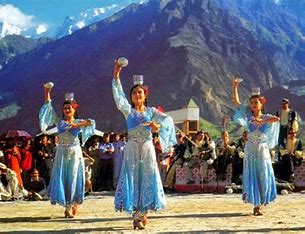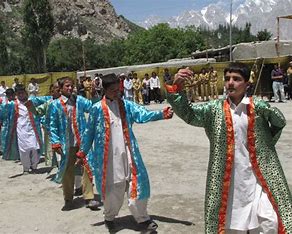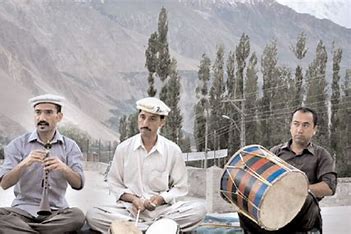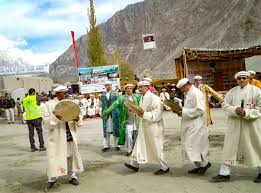GILGIT-BALTISTAN: A Crossroads of Civilizations Nestled within the towering Karakoram mountain range, Gilgit-Baltistan has long been a meeting point of ancient cultures and civilizations. During the 19th century’s “Great Game,” this region became a strategic frontier, where imperial powers maneuvered for dominance. Long before modern borders were drawn, caravans of traders, explorers, and wanderers passed through its twisting mountain passes—routes that would later become part of the historic Silk Road. The rugged isolation offered by these mountains allowed the people of Gilgit-Baltistan to preserve a rich cultural heritage, unique traditions, and a strong sense of local identity. Today, the region is administratively divided into seven districts: Gilgit, Ghizer, Hunza-Nagar, Diamer, Astore, Baltistan (Skardu), and Ghanche. Each contributes its own distinct traditions and stories to the collective soul of the region. LANGUAGE & LITERATURE: Voices of the Mountains Urdu acts as the common language of communication throughout Gilgit-Baltistan and is understood by the majority of its residents. However, the region is incredibly diverse linguistically. Shina, with its various dialects such as Asturjaa, Kharuchaa, and Chilasi, is spoken by roughly 60% of the population and dominates areas like Gilgit, Astore, and Diamer. In Baltistan, the Balti language—a derivative of Ladakhi and part of the greater Tibetan language family—is universally spoken. Wakhi is heard in the upper parts of Hunza and some villages in Ghizer, while Khowar is primarily spoken in Ghizer as well. The rare Burushaski language, with no known linguistic relatives, is spoken in Hunza, Nagar, parts of Yasin, Gilgit, and Punyal. Domaaki, a lesser-known language, is preserved within the musician communities. A small population also communicates in Pashto. Despite being grouped with Kashmir in political discourse, Gilgit-Baltistan has only a limited number of Kashmiri speakers. English is commonly spoken among the educated population, especially those involved in tourism, education, and public service. Shina literature promotes values of peace, unity, and pluralism, often reflecting the region’s spirit of coexistence. Poets like Abdul Khaliq Taj and Jamshed Dukhi have made significant contributions by using literature as a bridge across ethnic divides. Meanwhile, the Balti language, though shaped by historical challenges, has flourished in oral traditions. While prose is minimal, Balti boasts a wealth of oral literature including hundreds of proverbs and epic tales—like those of King Kesar and other folk heroes. Balti poetry is deeply influenced by Persian literary styles, enriching its rhythm, imagery, and melodic beauty.




Morning arrival at Islamabad International Airport. Meet and transfer to hotel. In the afternoon, visit the Faisal Mosque, the largest in Pakistan, and enjoy panoramic views from Daman-e-Koh. Overnight at hotel.
After breakfast, drive to Taxila and visit the archaeological museum and the ancient Buddhist sites of Bhirmond, Sirkap, and Julian Monastery. Continue through Abbottabad and Mansehra valleys to Besham. Overnight at hotel.
Drive to Gilgit with stops at ancient rock carvings in Shatial and Chilas. Stop at Thalichi for a view of Nanga Parbat. In Gilgit, visit the 7th century Buddha rock carving and local bazaar. Overnight at hotel.
Drive to Hunza Valley. En route, enjoy views of Rakaposhi from the viewpoint. Visit the 700-year-old Baltit Fort and explore Karimabad. Overnight at hotel.
Early morning drive to Duiker viewpoint for a sunrise view over Rakaposhi, Diran, and Ultar peaks. Visit Hoper village in Nagar Valley for a short hike to Hoper Glacier and enjoy apricot blossoms. Return to Karimabad. Overnight at hotel.
Visit Ganesh village with its ancient watchtowers and wooden mosques. See rock carvings along the Silk Road. Drive to Gulmit and visit the local cultural museum. Hike to Borit Lake and Ghulkin Glacier. Overnight at hotel.
Full-day excursion to Khunjerab National Park. Drive past Passu and Batura glaciers. Spot wildlife including ibex, Marco Polo sheep, and wild yaks. Return to Gulmit. Overnight at hotel.
Drive to Skardu, the gateway to the high mountains and long glaciers of the Karakoram Range. Transfer to hotel upon arrival. Overnight at hotel.
Visit Shigar Valley, gateway to K2. Explore the 17th century mosque and Shigar Fort. Return to Skardu. Overnight at hotel.
Drive to Khaplu, a scenic village on the Indus River. Visit the 16th century Khaplu Fort and the Tibetan-style Chaqchan Mosque. Return to Skardu. Overnight at hotel.
Morning flight to Islamabad (weather permitting), offering stunning aerial views of Nanga Parbat and the Himalayas. Transfer to hotel. Overnight at hotel.
Transfer to Islamabad International Airport for your return flight home.